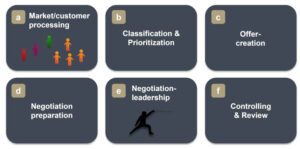The challenges in Big Deal Management
A lot of gut feeling
In many companies, even those with clear guidelines for pricing in the standard business, there is a lack of guidelines and tools for setting the bid price in the project business. Often, calculations are made using minimum margins and the final price decision is made on the basis of gut instinct. In the worst case, the price results from insufficient preparation during the negotiation. The importance of large projects for the company is often not considered enough in everyday life.
Information deficits
Decisions on major projects are often made under a lack of necessary information. This is especially true in cases where escalation rules require the involvement of top management without ensuring an adequate flow of information. It is not uncommon for board members to have to make decisions about large orders who have only limited familiarity with the details of the project and do not have comprehensive insight into the customer buying center.
Optimal pricing decisions cannot be made in the absence of the necessary detailed information. The management board must inevitably rely on the judgment of the responsible sales staff or make decisions based largely on gut instinct.
Missing structures
An important reason for suboptimal decisions in big deals is often a lack of structures and processes. If there are no standards regarding background research and information flows, it can be assumed that decision-makers are missing important aspects of the mosaic. They must make decisions under greater uncertainty than necessary. The chances for an optimal positioning decrease accordingly. Uncontrolled upstream processes have an additional complicating effect. In many companies, there are already deficits in the prioritization of offers, so that far too little energy is focused on the options that are relevant.
Approaches for successful big deal management
Big Deal Processes
As with standard business, big deals also require standardized processes to ensure high process quality and learning from experience. The process should start at the beginning, with the management of market development.
Opportunities must be systematically evaluated and prioritized to ensure optimal resource allocation. Negotiations require detailed preparation in order to be able to make the right decisions in the heat of the moment. Negotiations should not be subject to chance.

Use of tools
Appropriate tools are needed to ensure a systematic approach and long-term learning. Rating procedures are used to prioritize offers, and pricing tools are used to determine prices. It is crucial that the information, which is often distributed throughout the company, is consolidated, and prepared transparently for the decision-makers. In addition, templates should ensure systematic preparation for negotiations.
If the structure of templates and tools forces you to systematically analyze the deal, you reduce the likelihood of overlooking important information. For example, important insights into the customer’s opportunity costs, which would arise, for example, with a change of supplier in the event of a non-agreement. Differentiated assessments of award probabilities by members of the bid team create a solid basis for the final decision by top management.
Team Building
Analogous to the buying center in purchasing, it also makes sense to rely on teams in the sale of large projects. In this context, the classic key account manager serves as an orchestrator who assigns roles to the individual members of the team and deploys them in a targeted manner along the big deal process. This can also involve higher ranking individuals such as the board of directors, in case a face-to-face meeting of the executives substantially increases the likelihood of closing the deal. To avoid hasty decisions in the heat of the negotiation, it can also make sense to plan with a supervisor who is not participating in the negotiation themselves. This can be an external consultant as well as a colleague from sales without a concrete connection to the customer.
Project examples in Big Deal Management
In the past, Roll & Pastuch has successfully completed several projects in the field of Big Deal Management, thereby significantly increasing both the probability of closing and the prices achieved:
- Introduction Big Deal Management Process
- Introduction Big Deal Toolset
- Training of the sales teams
- Ghost Negotiation (Negotiation Support)
- Introduction of bid/no-bid and proposal budgeting process
Successfully tackling big deals
We will be happy to answer your questions and provide you with further information.
Learn more about Big Deal Management in our practical handbook ‘Big Deal Management‘.

